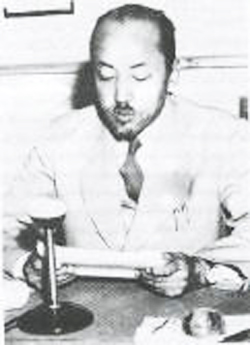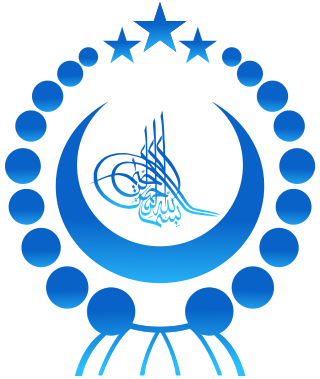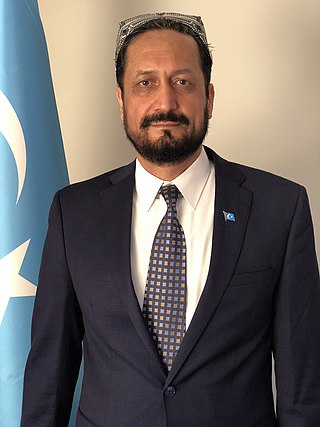East Turkestan Republic or East Turkistan Republic (ETR) may refer to the:

East Turkestan or East Turkistan, also called Uyghuristan, is a loosely-defined geographical region in the northwestern part of the People's Republic of China, which varies in meaning by context and usage. The term was coined in the 19th century by Russian Turkologists, including Nikita Bichurin, who intended the name to replace the common Western term for the region, "Chinese Turkestan", which referred to the Tarim Basin in Southern Xinjiang or Xinjiang as a whole during the Qing dynasty. Beginning in the 17th century, Altishahr, which means "Six Cities" in Uyghur, became the Uyghur name for the Tarim Basin. Uyghurs also called the Tarim Basin "Yettishar," which means "Seven Cities," and even "Sekkizshahr", which means "Eight Cities" in Uyghur. Chinese dynasties from the Han dynasty to the Tang dynasty had called an overlapping area the "Western Regions".

The Turkistan Islamic Party (TIP) is a terrorist Uyghur Islamic extremist organization founded in Pakistan by Hasan Mahsum. Its stated goals are to establish an Islamic state in Xinjiang and Central Asia, and eventually a caliphate.

The East Turkestan independence movement is a political movement that seeks the independence of East Turkestan, a large and sparsely-populated region in northwest China, as a nation state for the Uyghur people. The region is currently administered as a province-level subdivision of the People's Republic of China (PRC), under the official name Xinjiang Uygur Autonomous Region (XUAR). Within the movement, there is widespread support for the region to be renamed, since "Xinjiang" is seen by independence activists as a colonial name. "East Turkestan" is the best-known proposed name as it is the historical geographic name of the region and the name of the two independent states that briefly existed in the region in the first half of the 20th century.

The East Turkestan Liberation Organization (ETLO) was a secessionist Uyghur organization that advocated for an independent Uyghur state named East Turkestan in the Western Chinese province known as Xinjiang. The organization was established in Turkey in late 1997 to fight against the Chinese government in Xinjiang, a territory of ethnic Uyghur majority.

Muhammad Amin Bughra, sometimes known by his Han name Mao Deming and his Turkish name Mehmet Emin Buğra (1901–1965), was a Uyghur Muslim leader who planned to set up a sovereign state, the First East Turkestan Republic. Muhammad Amin Bughra was a Jadidist.

Isa Yusuf Alptekin was a Uyghur politician who served in the Chinese Nationalist government and opposed both the First East Turkistan Republic and the Second East Turkestan Republic. When East Turkestan (Xinjiang) came under Chinese communist control in 1949, Alptekin went into exile and became an ultra-nationalist and pan-Turkic separatist.

The January 2007 Xinjiang raid was carried out on January 5, 2007, by Chinese paramilitary police against a suspected East Turkestan Islamic Movement (ETIM) training camp in Akto County in the Pamir plateau.

The East Turkestan National Army was the armed forces of the Second East Turkestan Republic (ETR). It was active from 1945 to 1949, beyond the dissolution of the ETR in 1946, when it was renamed the Ili National Army per a peace agreement between the ETR leadership and representatives of the Republic of China. It originally consisted of six regiments: the Suidun Infantry Regiment, the Ghulja Regiment, the Kensai Regiment, the Ghulja Reserve Regiment, the Kazakh Cavalry Regiment, the Dungan Regiment, the Artillery Subdivision, the Sibo Subdivision, and the Mongol Subdivision. The last two subdivisions were later reformed to regiments. All regiments were armed with mostly German-made weapons that were provided by the Soviet Union on orders by Joseph Stalin. Its personnel was trained in the Soviet Union. Rebel aviation included 42 airplanes, which were captured in the Ghulja Kuomintang air base and repaired by Soviet military personnel.

The incorporation of Xinjiang into the People's Republic of China, known in Chinese historiography as the Peaceful Liberation of Xinjiang, was the takeover of Xinjiang by the Chinese Communist Party (CCP) and its People's Liberation Army (PLA) in the waning days of the Chinese Civil War. At the time, Xinjiang was divided into ten districts. The Republic of China controlled seven districts and governed them as Xinjiang Province, while the other three were governed by the Three Districts Economic Commission which consisted of the former leadership of the Second East Turkestan Republic.

The World Uyghur Congress (WUC) is an international organization of exiled Uyghur groups that claims to "represent the collective interest of the Uyghur people" both inside and outside of the Xinjiang Uyghur Autonomous Region of the People's Republic of China. The World Uyghur Congress claims to be a nonviolent and peaceful movement that opposes what it considers to be the Chinese "occupation" of 'East Turkestan' and advocates rejection of totalitarianism, religious intolerance and terrorism as an instrument of policy. It has been called the "largest representative body of Uyghurs around the world" and uses more moderate methods of human rights advocacy to influence the Chinese government within the international community in contrast to more radical Uyghur organizations.

The Kökbayraq is a flag used to represent the geographical region of East Turkestan in Central Asia. The flag was originally used as the national flag of the short-lived breakaway state known as the First East Turkestan Republic (1933–1934). The Kökbayraq has a white crescent with a five pointed star on blue background, it was adopted on 12 November 1933 as the national flag of the First East Turkestan Republic during Declaration of independence. With the exception of the blue background, the flag is identical to the Flag of Turkey. Uyghurs and other East Turkistanis in the diaspora fly the flag as their ethnic flag.

The Emblem of East Turkestan was adopted on 12 November 1933, when the Islamic Republic of East Turkestan declared independence. After the fall of the Islamic Republic, it became a symbol of the East Turkestan independence movement and appears on the official emblem of the East Turkistan Government in Exile.
Turkestan is a region in Central Asia historically populated by Turkic peoples.

Anwar Yusuf Turani is a self proclaimed ethnic Uyghur nationalist and separatist leader. Born into a family branded counter-revolutionary by the Chinese government, Turani was raised in a labor camp where he faced economic hardship and political oppression. He attended Kashgar Teacher's College and graduated from the Department of Physics in July 1983. Turani came to the United States on August 12, 1988 and became the first Uyghur political asylee. In 1995, he established the East Turkistan National Freedom Center (ETNFC), a non-profit human rights organization based in Washington, D.C. He is the first person to start the East Turkistan independence movement in the United States. Having spearheaded the formation of the East Turkistan Government in Exile (ETGE) on September 14, 2004 in Washington, D.C., Turani went on to become the first Prime Minister of the entity.
Yusupbek Mukhlisi (1920–2004) was a Uyghur nationalist, former military officer, and the leader of the United Revolutionary Front of East Turkestan (URFET) who advocated for the restoration of an independent East Turkistan Republic.
The East Turkistan Education and Solidarity Association (ETESA) is a Uyghur Islamist organisation based in Istanbul, Turkey.
"Qurtulush Yolida", also known as "Qurtulush Marshi", is a Uyghur patriotic song which served as the national anthem of the First East Turkestan Republic and serves as the de facto anthem of the East Turkistan Government in Exile. The song was written by Mehmet Ali Tevfik in 1933.
The East Turkistan National Movement also known as the East Turkistan National Awakening Movement is a non-profit human rights and political advocacy organization established in June 2017 in Washington D.C. Salih Hudayar, a Uyghur American consultant and graduate student founded the group after pre-existing Uyghur organizations failed to openly call for East Turkestan independence deeming it "controversial".

Salih Hudayar is a Uyghur-American politician known for advocating for East Turkistan independence. He founded the East Turkistan National Awakening Movement and has since been leading the movement calling for the "restoration of East Turkistan's independence."

The East Turkistan Government in Exile, also known as the Government in Exile of the Republic of East Turkistan, is a political organization established and headquartered in Washington, D.C. by Uyghurs, Kazakhs, and other peoples from East Turkistan (Xinjiang). The ETGE claims to be the sole legitimate organization and a parliamentary-based government in exile representing East Turkistan and its people on the international stage.